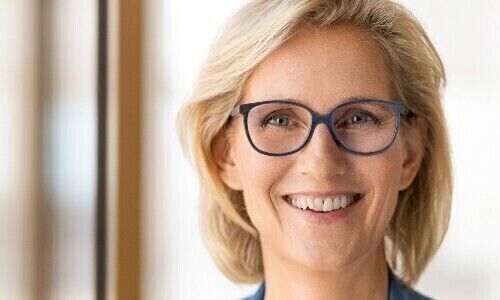Ermotti Succession at UBS: Mission Impossible for Sabine Keller-Busse
The Head of UBS Switzerland is facing challenges in Personal & Corporate Banking. Meanwhile, achievements in Swiss Wealth Management are also credited to Iqbal Khan in Asia. This is a challenging situation for Sabine Keller-Busse, finews.asia reports.
All «Mission Impossible» movies follow a familiar formula: Ethan Hunt’s (Tom Cruise) undercover team is tasked with seemingly impossible missions, whether it’s stopping a villain or saving the world.
Against all odds, the team always pulls off the unthinkable, bringing the mission to a successful conclusion.
Contender to Succeed Ermotti
It wouldn't be surprising if Sabine Keller-Busse, head of UBS Switzerland, considers herself in a similar plotline.
The spotlight on her position has increased since she emerged as a possible candidate to succeed Group CEO Sergio Ermotti, who is assumed to be retiring somewhere around 2026. Other potential successors include Iqbal Khan and Rob Karofsky, the co-heads of Global Wealth Management, as well as Beatriz Martin Jimenez, head of Non-Core & Legacy, and Aleksandar Ivanovic, head of Asset Management.
Challenges in Personal & Corporate Banking
Keller-Busse faces significant challenges in Personal & Corporate Banking (P&C), which forms the backbone of UBS’s Swiss operations. These hurdles are not only financial but also reputational, especially in Switzerland, where the bank has its global headquarters.
In Personal Banking, she is tasked with consolidating UBS’s traditional business with the operations it acquired from Credit Suisse. The process of exploiting synergies has generated public scrutiny.
Diverging Stakeholder Interests
The consolidation in Corporate Banking, however, has sparked even fiercer debate. As finews.com recently noted, some of the criticisms directed at UBS Switzerland are lacking in fairness.
Nonetheless, few would argue that Personal & Corporate Banking isn’t facing significant challenges. The differing expectations of various stakeholders alone make this situation feel like a «Mission Impossible.» As the saying goes, «You can’t please everyone.»
And What About Wealth Management?
At this point, readers might recall that UBS is, first and foremost, a global wealth management bank catering to (ultra) high-net-worth individuals, of which Switzerland has no shortage.
This brings us to a key challenge for Sabine Keller-Busse. She must share credit for Swiss Wealth Management’s success with Iqbal Khan, who has been running operations from Asia for several months (as finews.com previously reported).
Iqbal Khan Oversees Swiss Wealth Management
In a geographic restructuring announced in May, UBS split responsibilities between Khan and Karofsky, with Khan remaining in charge of Swiss Wealth Management.
UBS operates under a kind of matrix structure, where responsibilities are divided both functionally and geographically. Functionally, Keller-Busse oversees Corporate & Private Banking, while Khan is responsible for a portion of Wealth Management. Geographically, Keller-Busse leads Switzerland, while Khan oversees Asia-Pacific.
A Highly Profitable Business
By the numbers, Swiss Wealth Management is a significant contributor to the bank’s bottom line. UBS’s 2023 annual report shows revenues of 2.829 billion dollars from this segment (nearly 14 percent of the global total) and a pre-tax profit of 1.209 billion dollars, which represents over a third of the division’s global earnings (33.7 percent).
In other words, Swiss Wealth Management is highly profitable. The question, then, is who should take credit for this success: Keller-Busse or Khan?
A Matrix of Responsibilities
UBS maintains that Keller-Busse and Khan share responsibility for Swiss Wealth Management, including Profit & Loss (P&L). August Hatecke, head of Wealth Management in Switzerland, reports to both of them.
However, in the financial reporting available to the public and analysts, revenues from Swiss Wealth Management are attributed to Global Wealth Management, which falls under Khan’s jurisdiction.
Keller-Busse Judged Primarily by P&C
UBS has declined to reveal details about how the success of Wealth Management is divided between Keller-Busse and Khan or how Wealth Management figures into Keller-Busse’s own compensation incentives.
It seems likely that the external perspective, as reflected in UBS’s financial reports, prevails internally as well: Sabine Keller-Busse is primarily judged on her performance in Personal & Corporate Banking, where she holds both functional and geographic responsibility.
Turf Disputes Between Divisions?
Some clients who use both Wealth Management and Corporate Banking services have told finews.com that they have noticed signs of internal tension since UBS’s acquisition of Credit Suisse.
These clients suggest that there may have been occasional turf battles between Wealth Management and Corporate Banking.
Target: 19.5 Percent Return in P&C
UBS denies this interpretation, instead highlighting its strength as a universal bank that offers a holistic suite of services to meet clients’ needs.
At the same time, Keller-Busse faces the pressing task of restoring Personal & Corporate Banking to a return on attributed equity of at least 19 percent. After the acquisition of Credit Suisse Switzerland, this figure fell from 19.5 in 2022 to 14.7 percent in the first half of 2024.
This brings us back to the theme of «Mission Impossible.» If Sabine Keller-Busse can manage to smooth over the frictions while boosting UBS Switzerland’s profitability, she could well cement her position as a frontrunner to succeed Sergio Ermotti.



























